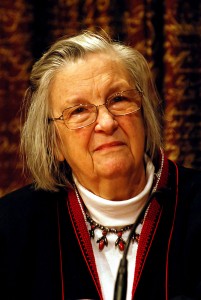On twitter the other day, I was joking that I’ve adopted a new approach to my book research: when confronted with a problem, I first ask, “Did Elinor Ostrom write about this?”
Ostrom won the economics Nobel in 2009 for her work on how communities solve common pool resources problems, work that’s central to the themes I’m exploring in my book. But the occasion for my twitterquip was Ostrom’s appearance in an entirely different field, a post by my friend Luis Villa on the issue of free riding in the free software world:
As I’ve explained before here, a major reason why people choose copyleft/share-alike licenses is to prevent free rider problems: they are OK with you using their thing, but they want the license to nudge (or push) you in the direction of sharing back/collaborating with them in the future. To quote Elinor Ostrom, who won a Nobel for her research on how commons are managed in the wild, “[i]n all recorded, long surviving, self-organized resource governance regimes, participants invest resources in monitoring the actions of each other so as to reduce the probability of free riding.” (emphasis added)
This afternoon, I encountered yet another of my realms in which Ostrom applies: institutional transparency. This sunshine stuff is the lifeblood of journalism, and Ostrom is on it! This is from her doctoral thesis, a study of the formation of the West Basin Water Association and other associated institutions for the management of water in Southern California’s West Coastal Basin:
The association has maintained a policy of open files. Any interested person can gain ready access to a wealth of information about the basin by going to the association office. As a consequence, all producers in West Basin have equal access to the same information. No one enterprise can exploit a favored position in the association and control the action of others by eliminating their sources of information. Also, the superior capacity of some of the larger water producers to gain information about the physical system is thus balanced by the association which has command of sufficient resources itself to gain detailed information about the operation of the basin.
And then she adds, in a footnote:
This policy of an open office and open files also enables a researcher to gain access to a wealth of information about how an organization such as this arrives at decisions and implements its decisions – for which the present writer is deeply appreciative.

